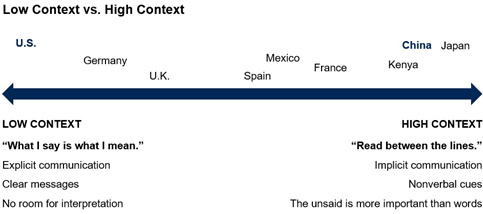24 Jun East vs West: 5 Cultural Differences International Student Should Know
Table of Contents
As a result of globalization, the world is becoming a more multicultural place with people from different ethnic groups and religious backgrounds living, working and cooperating in the same place, without giving up their own identities, beliefs and values.
Diversity makes a country stronger and more dynamic. However, in today’s diverse workplace, cross-cultural communication can seem challenging at first, even without a language barrier. This is understandable since every culture has its own set of assumptions and customs when it comes to face-to-face interactions and getting a certain point across.
“When working in a multicultural team or in a different country, it is imperative to understand how different cultures communicate in the workplace and how to adapt and embrace those differences.”
A significant emphasis must be placed on the concept of acceptance, active listening and open mindedness. Ultimately, the difference between success and failure lies in being able to understand, accept and learn from different cultures.
In this article, you will find some of the most prevalent cultural differences between the East and the West and how these differences can affect business communication. It is important to comprehend that everything explained in this article might not be 100% accurate to your personal experience or perhaps to your own culture, but this insight can serve as a starting point. We still encourage you to do plenty more research into the specific country or region you will be undertaking your internship in!

1. Business communication
According to the renowned anthropologist Edward Hall, you can differentiate intercultural communication by defining each culture by the value they place on indirect or direct communication. Edward Hall developed the concept of high-context and low-context cultures, and wrote several books on dealing with cross-cultural issues.
Low-context cultures
Low-context cultures, such as Germany, the US and Australia, rely on direct communication and the use of concrete language to get a point across, more of the information in a message will be spelled out and defined.
“They say what they think and think what they say.”
Cultures with Western European roots are generally considered to be low-context cultures. Most low-context cultures will speak openly and will find it acceptable to express anger, frustration or discontent.
High-context cultures
High-context cultures, such as Japan and China, rely more on indirect, non-verbal communication. These cultures will prefer to maintain an overall harmony and avoid conflict at all costs. In fact, Asian cultures are built on a Confucian notion of social harmony and strict hierarchy, straight talk is avoided at all costs since it conveys “losing face”.
The concept of “losing face” is at the core of Chinese culture. When you lose face, it means your ability to function as part of the social order has been damaged. You have lost influence and injured your reputation. Thus, in China criticizing a work colleague in front of other team-members is unthinkable. Criticism is saved for private interactions instead, and is often delivered through a third party.

2. Business relationships
In low-context cultures…
Business relationships begin and end quickly in countries such as the US and Australia. Productivity depends on procedures and paying attention to the goal. For example, most American executives can establish a business relationship with another American or European executive through one or several phone calls, or one meeting.
In high-context cultures…
When doing business in places like Asia, building a relationship is important. However, relationships in Asia take time to develop, and getting introductions from friends, colleagues, or classmates is the key. Asians put their trust in personal relationships and strive to find a personal connection with anyone they engage in business with.

3. The importance of hierarchy
The figure of the director, CEO or leader in every company is seen differently depending on the culture you were brought up in. Cultural differences in the perception of leadership styles can create unexpected misunderstandings. Eastern and Western cultures have a different perception of power and power distance. Eastern cultures tend to have a very hierarchical structure, where Western cultures are more egalitarian.
“Western cultures value independence and tend to promote individuals who are task orientated and individualistic.”
A Western employer would like his or her employees to show initiative and show their own personal skills. On the other hand, an Asian leader will focus on collective achievements and will expect his or her employees to respect the hierarchical structure of the company by being loyal to the company and working as a group.
4. Punctuality
Being on time for work-related events is a big part of corporate culture in both the East and the West. Nobody likes to wait around for someone else to arrive and it’s generally considered rude and unprofessional to be late. Nevertheless, there are a few potential complications that you ought to be aware of.
In the West, especially in countries such as Spain, local norms can be challenging even between Westerners of different origins. Though people try to arrive at a designated time and start meetings without much delay, it’s become more and more commonplace to adhere to flexible hours. In this context, as long as the work gets done, and meetings are attended, there is usually nothing to worry about. Having said this, always try to be on time but do not despair if in some cultures people arrive a few minutes late.
In Eastern countries, such as Japan, arriving on time is of the utmost importance. In fact, to avoid their passengers getting into trouble with superiors at work, Japanese railways have staff handing out ´train delay certificates´ which will prove the passenger’s tardiness was through no fault of their own. The conductor will also apologize over the train’s intercom.
5. Asking questions
The simple act of asking a question can be received in different ways by the person being asked the question, but also by the people that are witnessing this scenario. You will soon learn the differences when carrying out your internship in an Eastern or Western country.
“In Western countries, asking questions is encouraged by employers since it shows initiative and proactiveness. Employers value individuals asking questions since it shows that they are eager to learn and they are willing to become an asset to the organization.”
On the other hand, as previously mentioned, in Eastern countries, more emphasis is placed on the importance of politeness and not openly discussing opinions, disagreements, or pointing out flaws. Thus, there is a fear that superiors might see questions as threatening, since they would have to clarify their position on a given subject.
Examples of business failures due to cultural differences
When businesses decide to conduct operations with partners or customers from different cultures, a crucial aspect for success lies in the understanding of cross-cultural differences. Below you will see some examples that can shed light on how a minor cultural misunderstanding or communication error can cause damage to the business relationship.
Heineken example
During the 1994 World Cup Football tournament, Heineken engaged in a special promotional campaign where they imprinted the flags of the countries qualifying for the World Cup under the bottle caps of their beers. One of the flags was the Saudi Arabia flag, which depicts a holy verse. Thus, many Muslims were angry at the fact that a holy verse would now be associated with alcoholic beverages. Consequently, the brewer had to discontinue its promotion due to a simple cultural oversight.
eBay example
In Asia one of the most important values is trust, thus the business model of online transactions can’t be a purely transactional one. Online transactions must include an option to communicate successfully to build trust between the buyer and the seller. However, the eBay platform in Asia did not provide tools to enable buyers to locate online sellers and communicate with them immediately about potential transactions. eBay failed to understand the difference in cultural values in norms between the US and Asia.
[10 Corporate Cultural Differences All Interns Abroad Should Know]
At Absolute Internship, we believe it is vital to provide cultural sensitivity training, such as informing future interns about the diverse communication styles, the disparate business and cultural differences, and the distinct negotiation approaches in different countries. This way, you can make the most out of your internship in a foreign company without worrying about the minor cross-cultural communication barriers.



No Comments